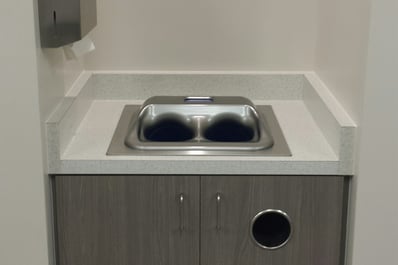Cruise Ship Hygiene – Don’t Be the Next Big News Story
According to the American Association of Port Authorities and the Florida-Caribbean Cruise Association, cruises are a $37.85 billion industry in the United States, with the annual number of cruise passengers averaging well over 20 million. That’s a lot of people willing to be isolated with their new closest friends on a boat in the middle of the ocean. With all of these bodies in one relatively small space for days at a time, the chances for spreading germs around are high. The spread of norovirus is typically associated with cruise ships because the close living quarters increases the amount of group contact. Most of us have heard of the recent virus outbreaks on cruise lines, so how can you prevent being the next big news story involving wide-spread illness on a cruise ship? Other than choosing not to cruise, take a look at these cruise ship hygiene tips, including cruise ship hand washing and ways cruise lines can improve their VSP scores.
Why Is Cruise Ship Hand Washing So Important?
Gastrointestinal illnesses involve stomach inflammation, which leads to not-so-pleasant side effects involving your gastrointestinal system. According to the CDC, infections that cause gastrointestinal illnesses can either be “viral, bacterial or parasitic.” It spreads by individuals who have the virus touching elevator buttons, handrails, utensils and other people. With the close quarters and high-traffic use of surfaces by a large amount of people, gastrointestinal illnesses can spread like wildfire on a cruise ship. What is the best way to prevent yourself from catching a gastrointestinal illness while cruising? Washing your hands as frequently as possible. This may seem like overkill, but you’d be surprised just how many surfaces you touch on any given day—and how many other people touch those same surfaces.
How Often Should I Wash My Hands?
The CDC recommends always washing your hands before putting them to your mouth. This includes before eating and drinking, brushing your teeth and even smoking. Additionally, it’s always wash your hands after going to the bathroom, blowing your nose, changing diapers, or helping a sick person. After you’ve been out and about on the cruise ship touching “high-hand contact surfaces,” including railings, door knobs and elevator buttons, immediately wash your hands when you get back to your cabin and as often as you can using soap and water. .jpg?width=302&name=IMG_1317%20(1).jpg)
The Proper Way to Wash Your Hands
Michigan State University researchers found that about 95 percent of people don’t wash their hands properly. Talk about a staggering statistic. If you want to make sure you’re washing your hands correctly, follow these simple steps every time. First, using a fairly large amount of soap, rub your hands together quickly, and spread the soap all around and lather for no less than 20 seconds. After you rinse your hands, use a paper towel to dry them off, and then turn off the faucet and open the bathroom door with that same paper towel. Or, if applicable, using a “no-touch hand sink and dryer” which keeps you from contaminating your hands again by accidentally touching the faucet.
How Can Cruise Lines Improve Their VSP Scores?
A VSP score comes from the Vessel Sanitation Program at the CDC. Even though manual hand washing can do the trick in some instances, in high-traffic areas such as cruise ships, you cannot guarantee that everyone will do a stellar job themselves. Meritech offers “handwashing systems,” which are the “only fully automated handwashing systems in the world.” It removes 99.98% of pathogens and it only takes 12 seconds. Whether used by the crew, or in high-traffic public areas throughout the ship, these “handwashing systems” will ensure that everyone’s hands are getting 100 percent clean, 100 percent of the time. 
For more information about CleanTech Automated Handwashing Stations for cruise, contact our partners in Maritime hygiene and safety: Vikand. Vikand is advancing health and safety in the industry providing medical service solutions to 170+ cruise vessels, impacting 14,000,000 guests and 120,000 crew globally annually as well as numerous other maritime and remote industry clients worldwide.
Automated Handwashing Stations for cruise, contact our partners in Maritime hygiene and safety: Vikand. Vikand is advancing health and safety in the industry providing medical service solutions to 170+ cruise vessels, impacting 14,000,000 guests and 120,000 crew globally annually as well as numerous other maritime and remote industry clients worldwide.






